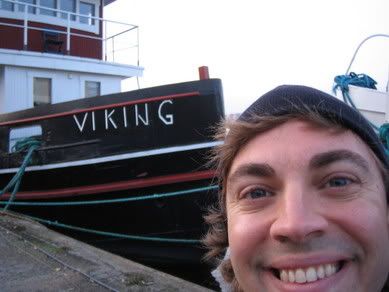Read BoingBoing's linking policy. It's terrific.
And following the links offers a further understanding of the do-we-call-it-paranoia, or just plain fear of this "new" medium? We discussed in class the value of Wikipedia and subsequently the value or weight or legitimacy of Internet research. We are clearly headed into the electronic age, no? So, when will the information contained (what a funny word to use in the context of the vast and unregulated, unfettered world of the Internet) online become legitimized? Will it?
I remember when we first started using the Internet and most people believed the information found online to be untrustworthy. We still believed that print was where it's at. People could be quoted as saying, "Well, I found it on the Internet. So, who knows?" The idea that anybody could put anything up on the World Wide Web somehow cheapened the information. Now, I believe, the sentiment is still prevalent but we have begun to accept the direction our information spreadin' is headin'. People get their news from the Internet. They book vacations that actually materialize (in real life!) on the Internet. They realize they have access to zillions of pieces of unnecessary information. No matter who put it there, the fact that we can hear the real voices of Alvin and the Chipmunks makes us feel more powerful. Immediacy of information.
I believe it promotes learning. Now, we can walk to the gigantic electronic library in our living room to answer any question (big or small) in an instant. We no longer let learning opportunities pass us by. Heard 1.65 billion (dollars to buy YouTube) times a day: "We'll google it." [Funny that "google" flags the spell-checker on the Google-owned Blogger.]
Back to the paranoia of unregulated systems, though. Is that it? Is it the new frontier with no rules, or rules made up by whoever makes them? When the government was toppled in Iraq and the warlords took over—making rules, commandeering people's cars at gunpoint because they could, killing citizens, who just sold their properties so they could leave the country, in order to steal the sale money—this was frontierland. It is scary. When you need to be constantly vigilant about your listing on Wikipedia because anybody could just poke in there and change it or even delete you from the annals of Wikihistory, this is not a peaceful world. While the lack of regulations might allow for freewheeling outlaws, it still allows our own personal freedoms—of speech, for example. And we see now that certain protocols are falling into place, or are at least being played with. I mentioned the next step in the evolution of wiki software (found in Urban Dictionary) as a rating system for entries, which moved the most "agreed upon" entries to rise to the surface. This doesn't necessarily guarantee accuracy. I mean, look at my pet peeve surrounding the phrase "Could care less." If we went with the most "agreed upon" usage, it would be wrong.
Where have I landed? I have no idea, but to say that this medium is exciting, ever-changing, evolving. We are learning-by-doing here, my friends.
30 October 2006
Subscribe to:
Post Comments (Atom)


No comments:
Post a Comment